Coffee authority marks 25 years
We want to make sure that everybody appreciates the value of coffee
Coffee production faces slump
By Geoffrey Mutegeki
Augustine Baitwamasa, 77, is a coffee farmer in Butiiti sub County, Kyenjojo district. He owns two acres of coffee, which he planted 30 years ago.
From these two acres, he earns about sh10m annually. It is from these earnings that Baitwamasa has been able to support his household of 15 people. "I used to earn much more than this, but now the crops no longer give me good yields," Baitwamasa says.
Pests and diseases, coupled with poor crop management practices have also contributed to Baitwamasa's low yields.
Coffee rehabilitation strategy
Despite his advanced age Baitwamasa, still works in his plantation and believes coffee is the crop to support him in old age. Baitwamasa is not the only Ugandan who is facing the challenge of low yields and poor quality coffee.
The problem cuts across the whole country. It is estimated that about 70% of the coffee plantations are aged and no longer productive, according to the Uganda Coffee Development Authority (UCDA) which is marking 25 years of existence.
"Majority of the trees are above 15 years old and are not as productive as they would be," UCDA managing director Emmanuel Niyibigira says. Coffee is no longer productive as it used to be 15 years ago and this is attributed to the effects of pest and disease and price fluctuations that affect the industry.
Ageing trees and poor cultivation and the poor post-harvest methods have long been responsible for low yields and quality. "Coffee suffered a serious catastrophe of coffee bore wilt in the 1990s which almost swept everything. But we recovered and are moving on well," Niyibigira says.
About two million people grow coffee in Uganda. While 42% of Uganda's population is directly or indirectly involved in the coffee sector. Currently, Uganda's coffee production stands at four million bags produced per year.
But this is bound to change with the new strategies UCDA has put in place to improve production. As UCDA marks 25 years, it has set an ambitious target of producing 20 million bags weighing 60kg each by 2020.
To achieve this UCDA has come up with a coffee rehabilitation strategy to replace old coffee trees, embark on free seedling distribution for use of improved farming practices among others.
"We are encouraging all farmers with ageing coffee plants to cut them. We are doing this at farm level and have started with some farms for demonstration so that other farmers can learn from this," Niyibigira says.
The process is called full stumping, which involves cutting the tree back to knee height and developing a new stem from the stump. Uganda is known for its quality Robusta coffee, which is 80% of all the coffee grown in Uganda whereas, Arabica is only 20%.
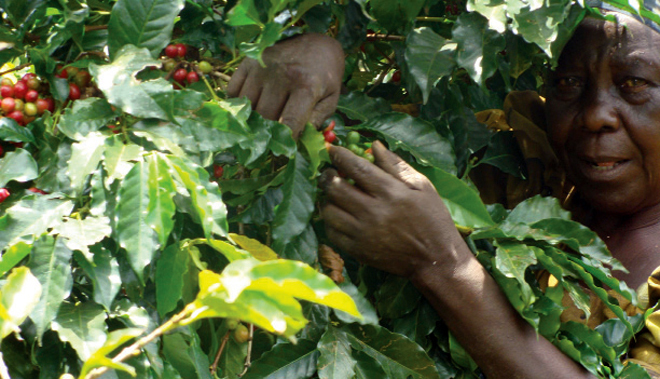 A woman picking ripe coffee. Many farmers are no longer earning much from coffee as it was in the past
A woman picking ripe coffee. Many farmers are no longer earning much from coffee as it was in the past
"We shall be distributing 900 million seedlings in the next three years, we are committed to boosting coffee production in this country and we shall achieve it," Niyibigira says.
More so, extension workers will be recruited at parish level, to guide farmers on the best coffee farming practices. They will be responsible for supporting farmers, registering them and train them to help curb the coffee seedling mortality.
"The coffee development agents will help us implement, the demand driven approach of giving seedlings to farmers who have dug holes and ready to plant coffee," he says.
Where possible, supplementary irrigation in the dry season will help maintain plant health and maximise yield potential. "Demonstrations on the use of fertilisers and irrigation are ongoing. We want to encourage people to try irrigation especially, drip irrigation," Niyibigira says.
UCDA is also in the process of certifying nurseries which are supplying seedlings, there are over two million nursery owners, producing over 150 million seedlings per season. Coffee seedlings are usually given to farmers who have dug holes ready to plant coffee.
Asaba Ikingura, a coffee farmer in Kabarole district, says the free seedlings he received have enabled him expand his plantation. "I received free coffee seedlings from UCDA, and have already planted one acre, I hope next season to get more and expand my plantation," Ikingura says. However, he calls for more investment in factories for value addition.
Coffee for export
Uganda is one of Africa's major coffee exporting countries, shipping millions more beans abroad probably than any other country on the continent alongside coffee powerhouse Ethiopia.
Uganda exported roughly 3.6 million 60kg bags of Arabica and Robusta in 2015, generating around $450 million in revenue. Coffee contributes about 22% of Uganda's total export earnings.
The largest buyers of the Ugandan coffee worldwide are found in Europe, the US and Sudan. "Only 6% of all the coffee we produce is consumed locally. If consumed more of our coffee we would be earning more," Niyibigira says. CLICK HERE FOR MORE
ADVERTISER
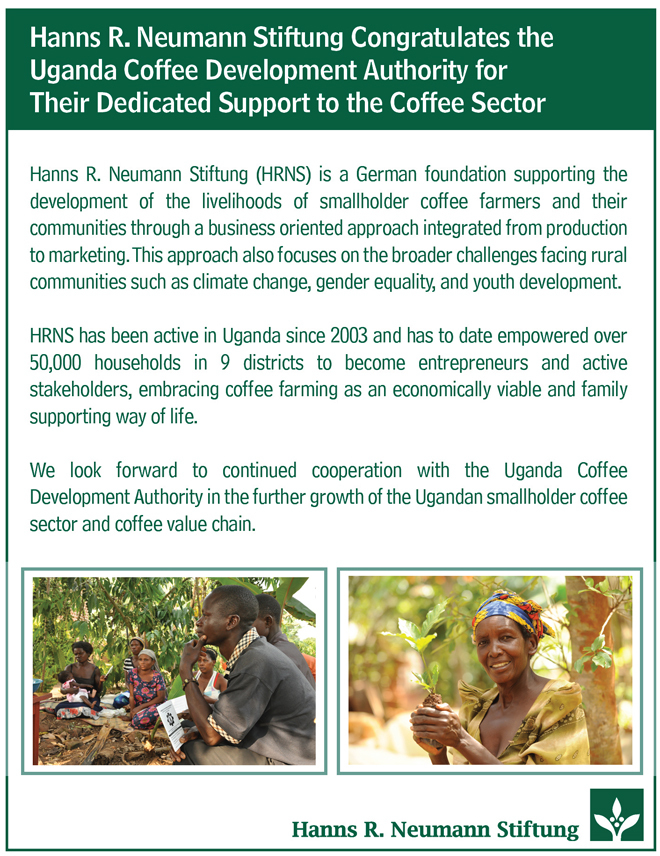
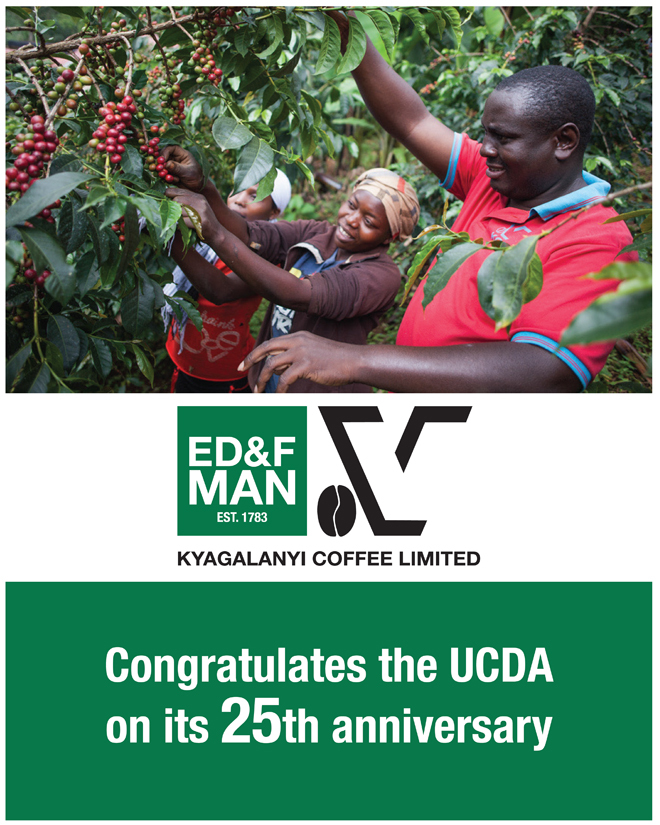
How to grow coffee
By Owen Wagabaza
When Samson Kabanda of Kasanda, Luwero heard about what the coffee farmers were earning, he was inspired to plant some coffee. With savings of about sh2m, he set out to plant coffee on three acres of their family land.
Unfortunately, when it reached the harvesting season, yields were not pleasing. Kabanda would later realise that he had not followed all the steps it takes to plant coffee.
Interestingly, many farmers find themselves in the same situation. According to experts, planting coffee on a commercial basis requires adequate preparations for good returns.
Planting
The coffee seedlings should be planted at the onset of the rainy season in holes measuring two feet by two feet wide and at least 45-60cm deep.
It is important that the holes are dug three months before planting. Patrick Kasambeko, a coffee management specialist at the National Agricultural Advisory Services, says the holes should be filled with top soil mixed with one bucket/basin of wellprepared manure or compost before planting.
He calls for ring mulching to keep the soil around the trees moist. Kasambeko says a small shade around each young plant should be provided to protect it from drought stress.
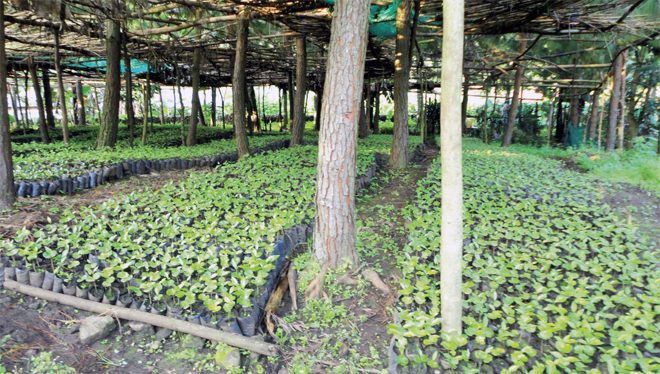 Coffee seedlings should be provided with shades to protect them from drought stress
Coffee seedlings should be provided with shades to protect them from drought stress
He, however, explains that spacing differs according to the variety. For example, Arabica coffee spacing can be 2.5 metres by 2.5 metres apart while for Robusta, 3 metres by 3 metres is ideal. The most common types of coffee in Uganda are Robusta and Arabica.
An acre of Robusta can accommodate up to 1,000 coffee trees and a seedling costs between sh300 and sh500. Farmers are, however, cautioned to buy seedlings from certified nursery operators. "As coffee grows, the maintenance costs tend to come down, but what is crucial in the initial stages is to keep the plantation weed free through mulching and weeding.
Expect a full yield after three years," Kasambeko says. Intercropping, especially with bananas is recommended to moderate the effects of drought. Proper spacing should, however, be put into consideration. Aside from bananas, one can plant shade trees to enhance soil fertility as well as reduce soil erosion. CLICK HERE FOR MORE
ADVERTISER
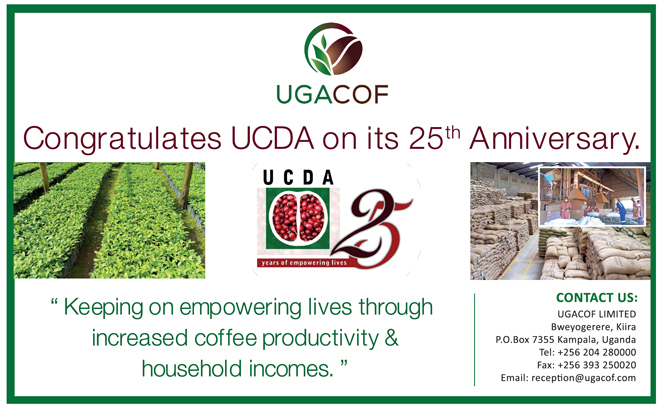
OWC drive revives coffee farming
By Geoffrey Mutegeki
Coffee farmers across the country have a target of planting 900 million seedlings by 2020 according to Maj. James Nkojo, the spokesperson of Operation Wealth Creation (OWC). The project, he says is jointly spearheaded by OWC and Uganda Coffee Development Authority (UDCA).
Coffee is one of three strategic crops which President Yoweri Museveni directed OWC to focus on as a strategy of transforming the lives of 68% of Ugandans who are still engaged in subsistence agriculture. Other crops include tea and fruits such as mangoes, oranges and pineapples.
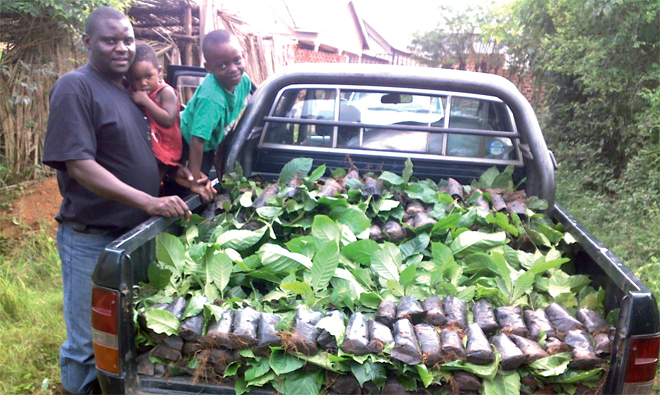 Joseph Nkandu, the executive director, National Union of Agribusiness and Farm Enterprises (NUCAFE) with coffee seedlings ready to be offloaded for planting
Joseph Nkandu, the executive director, National Union of Agribusiness and Farm Enterprises (NUCAFE) with coffee seedlings ready to be offloaded for planting
According to Nkojo, when OWC was set up in 2013, Uganda was producing three million bags of coffee annually. This has increased to more than four million bags of coffee with a capacity 60kg each. "We are a game changer in the coffee sector.
Under OWC the army has deployed experts to advise farmers on how best to plant coffee seedlings," Nkojo says. Over the last two years, over 170 million coffee seedlings have been distributed to farmers.
According to Nkojo, OWC is working with parish chiefs and extension workers to ensure that the seedlings are planted and looked after well. CLICK HERE FOR MORE
ADVERTISER
16th African Fine Coffee conference and exhibition
Uganda Coffee Development Authority (UCDA)
National Coffee Research Institute